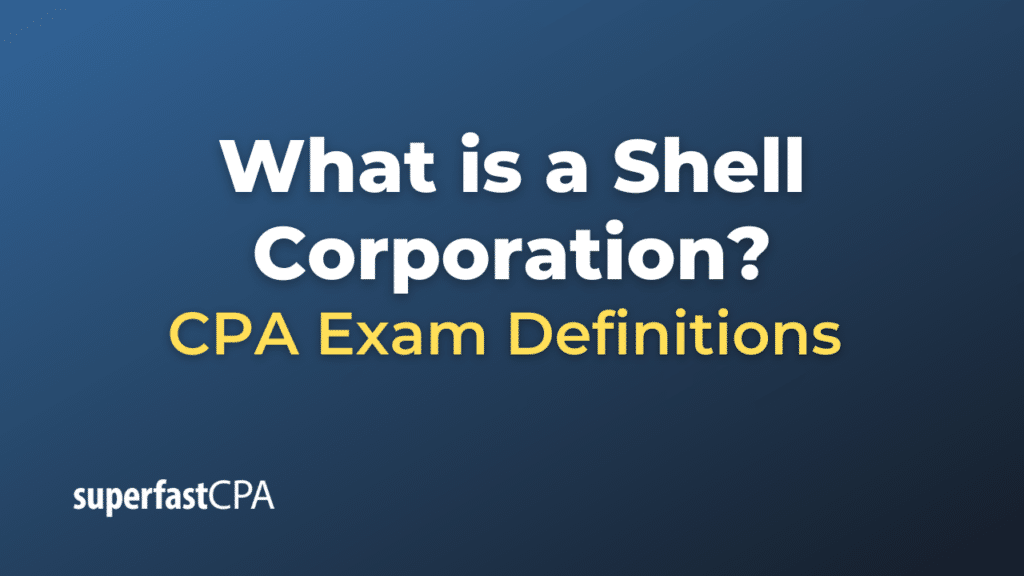Shell Corporation
A shell corporation is a company that exists only on paper and has no office or employees, but it may have a bank account and engage in financial transactions. It is legally constituted, but it does not conduct any real operations, produce goods, or provide services. Instead, it may serve other purposes such as:
- Facilitating Mergers & Acquisitions: A shell corporation might be used as a vehicle for various business maneuvers. For example, if a functioning company wants to become publicly traded without going through the lengthy initial public offering (IPO) process, they might merge with a shell corporation that is already publicly traded.
- Holding Assets: Shell corporations can be used to hold assets, such as intellectual property, real estate, or financial assets, separating them from the primary operations of another business.
- Tax Avoidance or Evasion: Some companies use shell corporations in tax havens to reduce their tax liabilities. These uses, especially when they involve hiding assets or income, can be illegal or controversial.
- Asset Protection: They can be used to protect assets from litigations.
- Confidentiality and Anonymity: Individuals or companies might use shell corporations to obscure their identities. This could be for legitimate reasons, such as protecting a well-known individual’s privacy in a real estate deal, or for more nefarious purposes, such as money laundering.
- Access to Different Markets: A company might use a shell corporation to gain access to particular financial markets or to achieve some other kind of business strategy.
It’s essential to differentiate between legitimate and illegitimate uses of shell corporations. While they can be used for various lawful purposes, they have also been linked to illegal activities like fraud, money laundering, and illegal tax evasion.
Example of a Shell Corporation
Let’s illustrate the concept of a shell corporation with a fictional example involving both legitimate and potentially questionable activities.
Example:
BrightTech Innovations is a startup in Silicon Valley focused on developing groundbreaking solar panel technology. The founders, John and Sarah, anticipate that once they have a prototype, they’ll need to protect their intellectual property (IP) and also potentially look for ways to expand into global markets.
Step 1 – Asset Protection: To protect their IP, John and Sarah establish a shell corporation named SunGuard Holdings in Delaware. This shell corporation doesn’t have any operations, employees, or physical assets. It exists primarily on paper and holds the patents for BrightTech’s solar technology. By placing their IP into SunGuard, they separate these valuable assets from BrightTech’s operational liabilities.
Step 2 – Foreign Market Exploration: BrightTech identifies a significant market opportunity in Southeast Asia. However, they are concerned about potential regulatory issues and decide to establish another shell corporation, BrightTech Asia Ventures, in Singapore. This company will explore market opportunities without directly involving the parent company.
Step 3 – Potential Red Flags: As BrightTech’s profits grow, John hears about ways to reduce corporate taxes by leveraging offshore financial centers. He sets up another shell corporation in the Cayman Islands, named SolarTech Financials. This corporation starts receiving “licensing fees” from BrightTech Innovations for using the solar panel technology. The primary purpose here is to shift profits to a low-tax jurisdiction, thereby reducing BrightTech’s overall tax liability.
In this example:
- The use of SunGuard Holdings is a legitimate and strategic decision to protect intellectual property.
- Establishing BrightTech Asia Ventures is a standard business practice to explore foreign market opportunities without exposing the parent company to undue risks.
- However, the establishment and use of SolarTech Financials in the Cayman Islands raise potential red flags. If the primary purpose of this shell corporation is to artificially shift profits to evade taxes, it could be viewed as illegal or, at the very least, ethically questionable tax avoidance. Authorities might scrutinize such arrangements, and the company could face legal consequences if found in violation of tax laws.
This example underscores the dual nature of shell corporations. They can serve legitimate and strategic purposes but can also be vehicles for illicit activities if misused.













